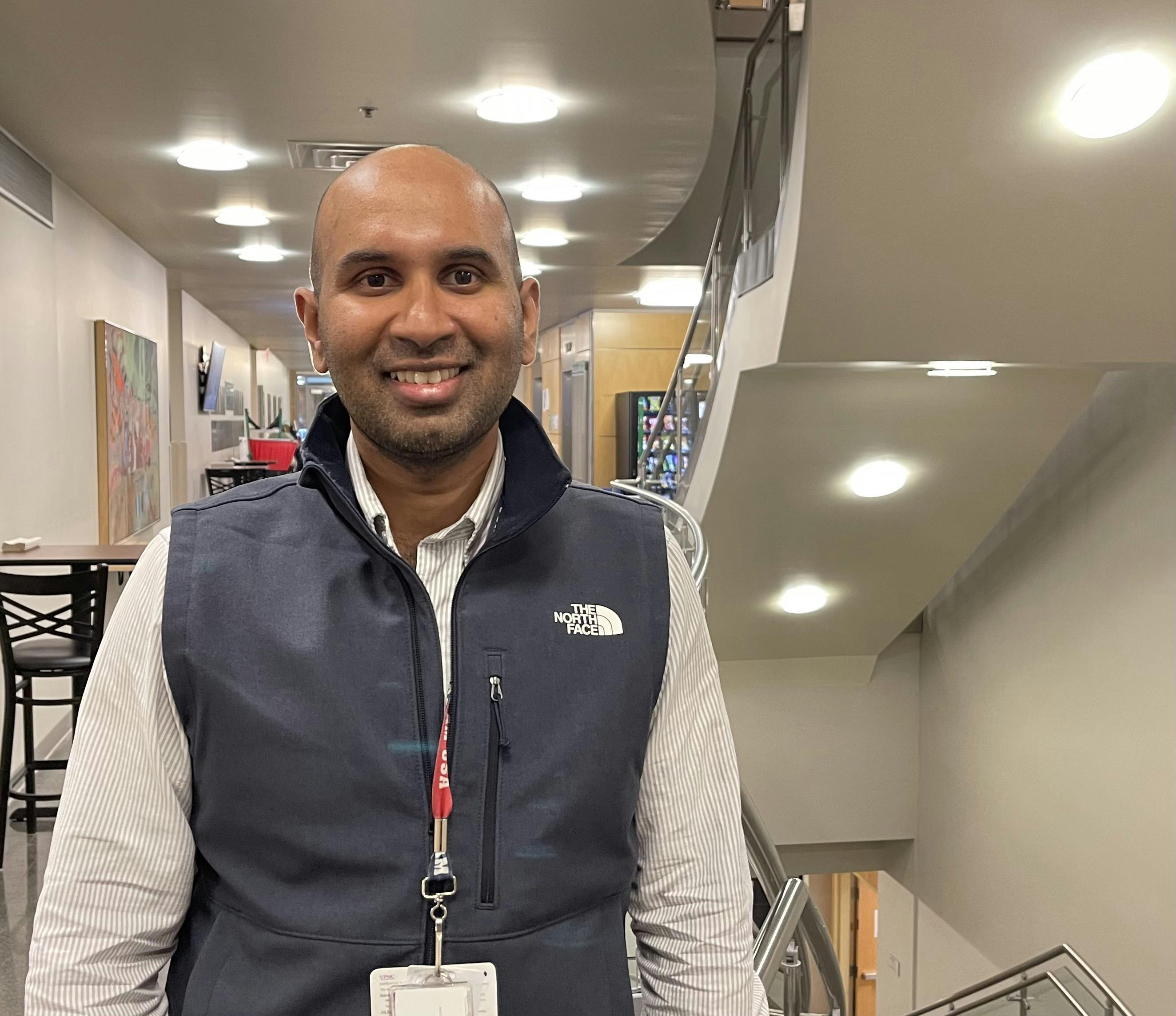Dr. Diwakar Davar
Cancer pioneer. Avid cyclist.
Dr. Diwakar Davar is a medical oncologist and hematologist at UPMC Hillman Cancer Center whose focus is treating advanced melanoma and testing new immunotherapies. He’s been nationally recognized for co-leading the team that developed the first human study using fecal microbiota transplants to change the gut microbiome in melanoma patients whose tumors had progressed past all standard therapies. Dr. Davar’s team at UPMC Hillman reduced tumors in 20% of patients and an additional 20% had disease stabilization, demonstrating that changing the gut microbiome can make a difference in advanced melanoma patients who hadn’t previously responded to immunotherapy.
Dr. Davar’s interest in immune therapy was kindled during residency and fellowship training in the 2010s. Two decades earlier, CTLA-4, a protein found on immune cells, was identified by Nobel Laureate James Allison and colleagues to be an immune checkpoint and was proposed as a potential therapeutic target to trigger antitumor immune responses. More than 20 years after the seminal proof-of-principle experiments in the preclinical setting, CTLA-4 inhibitors entered clinical testing and was FDA approved in 2011 following pivotal trials in melanoma. This development reinvigorated the field of cancer immunotherapy and catalyzed the development of immune checkpoint inhibitors targeting other pathways including another protein, PD-1, across a spectrum of cancers.
One key observation during this period was that these agents produced a spectrum of novel side effects – termed “immune-related adverse events” (irAEs) – characterized by inflammation of various organs including skin, gut, and lung. Another observation was that, in prior preclinical models, gut microbes appeared critical to the anti-tumor effects of immunogenic chemotherapy. Further, in clinical studies, gut bacteria in humans exhibited even greater diversity than in nonhuman trials. These observations raised the question of whether gut microbe composition could be responsible for the diversity of the immune checkpoint inhibitors response and irAE development. “I was looking for something nobody else had worked on. Many people were looking to test these drugs and combinations of these in other diseases. However, we already knew it was effective in melanoma, and it was clearly going to be used to treat other cancers, so the question of resistance and side effects became my focus.”
After finishing his training, Dr. Davar spent two years collecting specimens and writing trials, with support from UPMC Hillman.
“Everybody was focused on how to treat patients. Very few were asking, ‘What makes the drugs not work?’ We now have a whole team at Hillman working on that. My main collaborator is in the office next door. Eighty percent of the melanoma group is right here. We all talk to each other every day. Everybody’s research is being furthered by conversations we’re having since we’re in such close physical proximity to each other.”
While cancer is the obvious enemy, for Dr. Davar the side effects of cancer treatment run a close second.
“My passion is my patients. When I lose a patient or they have side effects, it’s very, very personal. It’s hard not to be affected by it. Everything we do is centered around trying to make a difference in the life of the patient. I’ve had patients who have stopped a life-saving drug because the side effects are just impossible to live with. You have to think about how to cure patients without affecting their quality of life.”
Dr. Davar’s team has now developed new trials targeting both immune therapy resistance and irAEs. They have microbiome trials in refractory melanoma and lung cancer that are pending activation.
“Immune therapy side effects are the flip side of immune therapy. They happen to a large extent because of over-activation of the immune system. We’re looking at whether microbial agents that affect the immune system can also treat side effects.”
Separately, they have developed trials to use gut microbiota to treat the severe colitis that occurs in 5-15% of immunotherapy-treated patients.
“The ultimate goal is immune therapy without side effects. The notion that treating the side effects is as important as treating the disease is completely new.”
To this end, the group is working on next-generation immunotherapy agent combinations which are combined with agents that manage side effects upfront including microbiome agents. These trials are being written for cancer patients, by cancer patients.
“For the first time, clinical trials are being written with patients. We’re thinking of patients as partners in clinical trials as opposed to participants.”
Powering the breakthroughs that drive intractable problems requires tremendous time, a team, and access to an infrastructure that supports the asking and answering of these questions. “In order to power research, you need people thinking through the problems, along with access to an infrastructure totally devoted to research. The multi-disciplinary, team-centered approach that we have at Hillman Cancer Center puts people who work with human specimens and lab specimens all under one roof so they can talk to each other, all day, every day, to ask and try to answer the important questions.”
There’s no question that Dr. Davar will be riding in next year’s Rush to Crush Cancer event. He bikes a hundred miles a week on trails throughout southwestern Pennsylvania.
“I’m really looking forward to riding in the event. It’s so important for people to understand that every dollar raised goes directly to cancer research. Pedaling a few miles can help patients who travel here from all over the world.”

“In order to power research, you need people thinking through the problems, along with access to an infrastructure totally devoted to research. The multi-disciplinary, team-centered approach that we have at Hillman Cancer Center puts people who work with human specimens and lab specimens all under one roof so they can talk to each other, all day, every day, to ask and try to answer the important questions.”
— Dr. Diwakar Davar